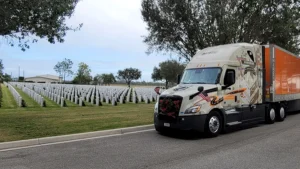WASHINGTON — The U.S. Department of Transportation’s (USDOT) Federal Motor Carrier Safety Administration (FMCSA) on May 11 added West Virginia to the list of states covered under an emergency waiver issued May 9 following a ransomware attack on Colonial Pipeline.
The temporary exemption from Parts 390 through 399 of the Federal Motor Carrier Safety Regulations (FMCSRs) applies to motor carriers and drivers providing direct assistance supporting emergency relief efforts transporting gasoline, diesel, jet fuel and other refined petroleum products to Alabama, Arkansas, District of Columbia, Delaware, Florida, Georgia, Kentucky, Louisiana, Maryland, Mississippi, New Jersey, New York, North Carolina, Pennsylvania, South Carolina, Tennessee, Texas, Virginia and — now — West Virginia.
The FMCSA and the Federal Highway Administration (FHWA) are tracking two states — Georgia and North Caroline — that have issued emergency declarations that include weight waivers for trucks on state roadways. Other states are considering similar action. FMCSA and FHWA are working with the full list of potentially effected states to share information and best practices and try to harmonize and align their efforts.
According to a May 11 statement from USDOT, the agency’s “top priority is safety, and while current circumstances dictate providing industry flexibility, FMCSA will work closely with its state and industry partners to monitor driver work hours and conditions for the duration of the exemption.”
The USDOT statement also noted that the Biden-Harris administration continues to assess the impact of the Colonial Pipeline incident on fuel supplies for the nation’s East Coast and Southeast regions, and is taking steps to evaluate resources that can be used to mitigate potential impacts.
On May 11, USDOT’s Maritime Administration (MARAD) initiated a survey of Jones Act-qualified vessels to determine the availability and capacity of vessels in the Jones Act Fleet to carry petroleum products within the Gulf, and from the Gulf up the Eastern Seaboard. The survey will help determine whether there is sufficient capacity on Jones Act-qualified vessels to carry the product and to if a waiver is warranted. The final authority to receive requests for and to approve waivers to the Jones Act belongs to the Department of Homeland Security.
In addition, USDOT’s Federal Railroad Administration (FRA) is working to determine the capacity of rail operators to help transport fuel products inland from ports.
USDOT’s Pipeline and Hazardous Materials Safety Administration (PHMSA) assisted Colonial Pipeline’s efforts to get Line 4 up and running yesterday on a manual basis and is continuing to support efforts to ensure safe movement of fuels manually, while concurrent efforts to restore the system’s operation continues.
The FBI on May 11 issued confirmation of the identity of the cyberattacker as Darkside ransomware, noting that the agency is working with Colonial Pipeline and government partners to investigate the case.
The Trucker News Staff produces engaging content for not only TheTrucker.com, but also The Trucker Newspaper, which has been serving the trucking industry for more than 30 years. With a focus on drivers, the Trucker News Staff aims to provide relevant, objective content pertaining to the trucking segment of the transportation industry. The Trucker News Staff is based in Little Rock, Arkansas.















